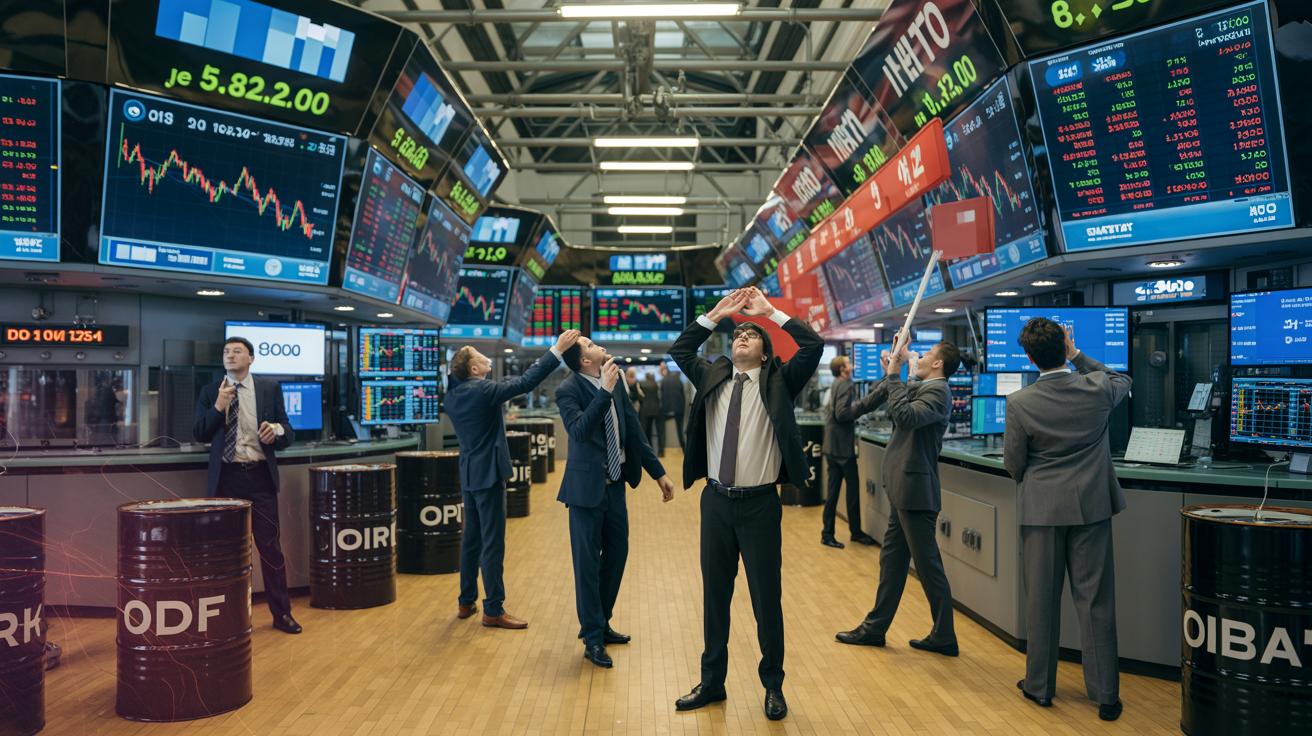What You Need to Know
- 🔥 Geopolitical Tensions Surge: The escalating conflict between Israel and Iran has significantly impacted global markets, causing volatility and investor anxiety.
- 📉 Stock Futures Decline: In response to the tensions, Dow Jones, S&P 500, and Nasdaq 100 futures experienced notable drops, reflecting market uncertainty.
- 🛢️ Oil Prices Rise: West Texas Intermediate crude futures surged by 2% amid fears of potential supply disruptions from the Middle East.
- 📰 Trump’s Provocative Statement: Former President Donald Trump’s call for an immediate evacuation of Tehran intensified market reactions and geopolitical concerns.
- 🤝 Trade Deal Overshadowed: Despite the announcement of a U.K.-U.S. trade agreement, market responses were muted due to the overriding influence of geopolitical events.
Amidst the ever-evolving landscape of global markets, recent developments have captured the attention of investors and analysts alike. The geopolitical tensions between Israel and Iran have not only influenced political dynamics but have also sent ripples through financial markets worldwide. In this article, we delve deep into the ramifications of these tensions on the stock markets and crude oil prices. With significant statements from influential figures like Donald Trump igniting further volatility, understanding these shifts becomes crucial for investors and policymakers. As we explore these events, we aim to provide a comprehensive analysis of how such geopolitical uncertainties impact both the short-term and long-term market outlook.
Geopolitical Tensions Escalate: Impact on Global Markets
The ongoing conflict between Israel and Iran has taken center stage in global news, with significant implications for financial markets. Investors are closely monitoring the situation as tensions continue to rise. Recently, U.S. stock futures took a downward turn following a controversial post by former President Donald Trump on Truth Social, urging an immediate evacuation of Tehran. This statement added fuel to an already volatile market environment, causing futures tied to the Dow Jones Industrial Average to decline by 301 points, or 0.7%. Meanwhile, S&P 500 and Nasdaq 100 futures also experienced drops of 0.6% and 0.58%, respectively.
Heightened geopolitical tensions often lead to increased market volatility as investors reassess their risk exposure. The uncertainty surrounding potential military actions and economic sanctions creates a challenging environment for market participants. As history has shown, geopolitical shocks can lead to short-term market disruptions, with drawdowns averaging 4.6% over approximately 19 days. However, markets have historically demonstrated resilience, recovering to pre-event levels within an average of 40 days.
Oil Prices Surge Amidst Uncertainty
The geopolitical tension has also had a significant impact on crude oil prices. Following Trump’s statement, West Texas Intermediate (WTI) crude futures advanced by about 2% in overnight trading. The conflict has raised concerns about potential disruptions in oil supply from the Middle East, which is a major oil-producing region. As a result, oil prices have become highly sensitive to any developments in the region.
The recent rise in oil prices comes after a period of cooling, with Brent crude and WTI futures settling more than 1% lower prior to the escalation in tensions. Investors and analysts are closely monitoring the situation, as further escalation could lead to higher oil prices and increased volatility in energy markets. The potential for supply disruptions is a significant concern for global economies, as higher oil prices can lead to inflationary pressures and impact consumer spending.
Investor Sentiment in the Midst of Conflict
Despite the geopolitical upheaval, investor sentiment has shown some resilience. On Monday, the major U.S. stock indices managed to close on a positive note. The Dow Jones Industrial Average gained over 300 points, while the S&P 500 and Nasdaq Composite posted gains of 0.9% and 1.5%, respectively. This positive momentum was partly driven by cooling oil prices earlier in the week, which provided some relief to market participants.
As investors navigate these uncertain times, they are also keeping a close eye on economic indicators and central bank policies. The Federal Reserve’s upcoming rate policy decision is a key event on the economic calendar, with expectations of rates remaining within the current target range of 4.25% to 4.50%. Investors are looking for any signals that could influence market dynamics and provide insights into the future direction of monetary policy amidst geopolitical tensions.
Trade Agreements and Market Reactions
In a separate development, the announcement of a trade deal between the U.K. and the U.S. garnered attention but had a limited impact on markets. The agreement, which includes slashed tariff rates on autos and zero tariffs on aerospace parts, was accompanied by praise from President Trump for British Prime Minister Keir Starmer. However, the FTSE 100 showed a decline of 0.5%, with companies that could benefit from the deal experiencing mixed reactions. For instance, Aston Martin Lagonda saw a slight increase of 0.76%, while Rolls-Royce declined by 1.2%.
The market’s muted response to the trade deal highlights the overarching influence of geopolitical tensions. Investors remain focused on the potential implications of the Israel-Iran conflict and are cautious about making significant moves amidst uncertainty. The unresolved issues surrounding tariffs on British steel and pharmaceutical firms further contribute to the overall complexity of the situation.
As the geopolitical landscape continues to evolve, investors and policymakers face the challenge of navigating uncertainty and potential market disruptions. With geopolitical tensions, oil price volatility, and trade agreements all playing a role, the path forward remains uncertain. How will these dynamics shape global markets in the months to come, and what strategies will investors employ to mitigate risks and seize opportunities amidst uncertainty?
Did you like it?4.4/5 (25)







8 comments
christian
Wow, geopolitics never fail to keep the markets on edge. Thanks for the insight!
savannahsapphire3
Does this mean we might face another global recession due to rising oil prices?
sophia6
Evacuate Tehran? Sounds like a plot from a Hollywood blockbuster! 🍿
alice_solstice0
Should I be worried about my stock investments now? Any tips on what to do?
OliveEnchantress
Trump’s statements always seem to shake things up; when will markets calm down?
ava
How will this impact the average consumer in terms of gas prices?
kennedy7
Thanks for the detailed update. It’s crucial to stay informed during these times.
ameliaillumination
Is this really happening or just another political stunt? 😅